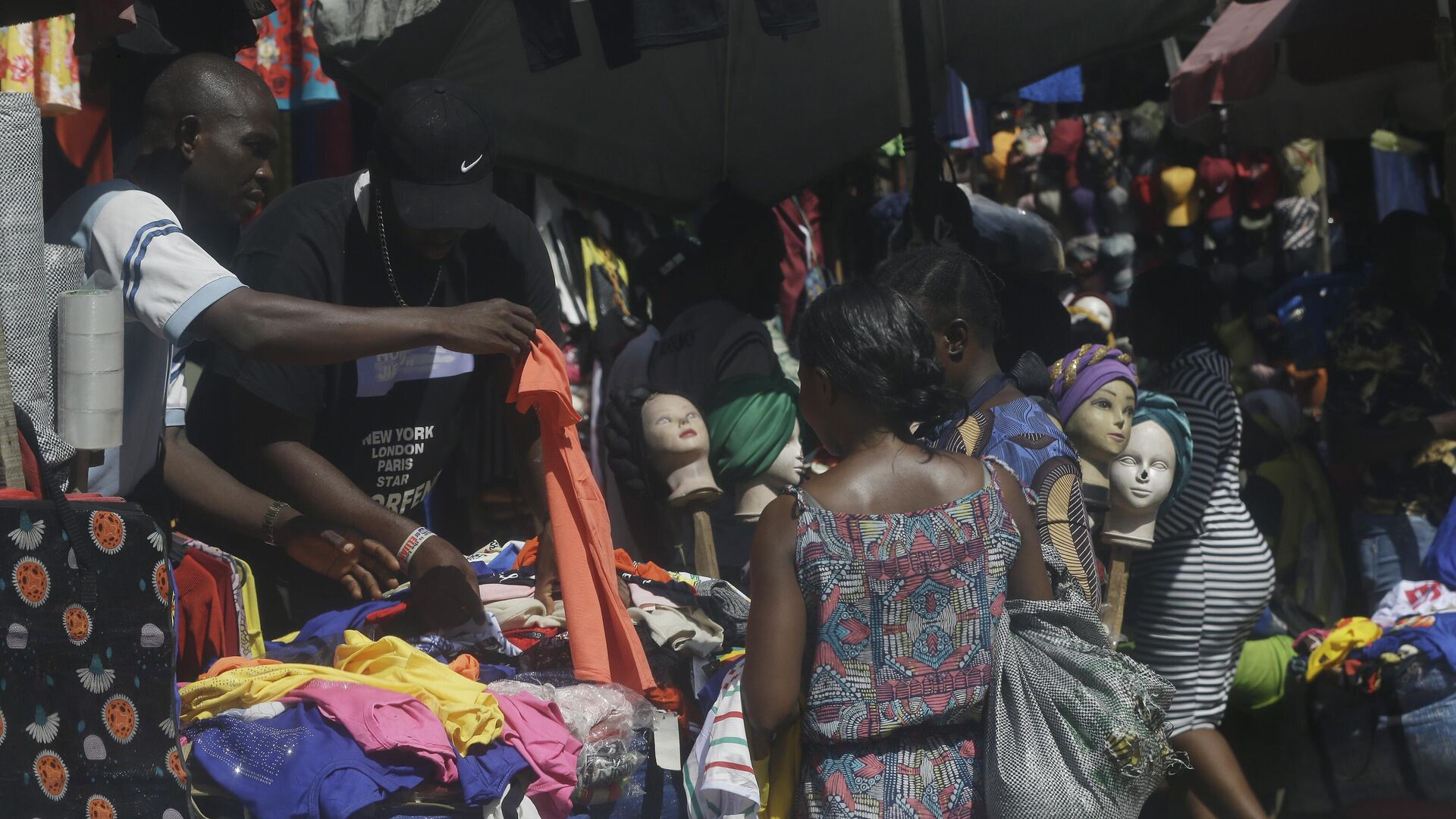https://en.sputniknews.africa/20230605/africa-not-a-dumping-ground-afcfta-ministers-ban-second-hand-clothes-to-promote-industrialization-1059722763.html
Africa 'Not a Dumping Ground': AfCFTA Ministers Ban Second-Hand Clothes to Promote Industrialization
Africa 'Not a Dumping Ground': AfCFTA Ministers Ban Second-Hand Clothes to Promote Industrialization
Sputnik Africa
African ministers, during the second retreat of the Council of Ministers of the African Continental Free Trade Area (AfCFTA), adopted a protocol to prevent the trade of second-hand clothes across the continent.
2023-06-05T14:21+0200
2023-06-05T14:21+0200
2023-06-05T14:21+0200
sub-saharan africa
african continental free trade area (afcfta)
trade
free trade agreement
free trade
https://cdn1.img.sputniknews.africa/img/07e7/06/05/1059723059_0:222:3072:1950_1920x0_80_0_0_92afcc1bb4e852f8f2c02666430c7fbd.jpg
African trade ministers have adopted a protocol to prevent the trade of second-hand clothes across the continent to promote industrialization on the continent.The decision was made during the second gathering of the Council of Ministers of the African Continental Free Trade Area (AfCFTA) - a group that comprises most nations on the African continent - which was held in Kenya's capital, Nairobi, to assess the AfCFTA's progress and tackle key implementation problems.Participants discussed the outstanding rules of origin for automobiles, textiles and clothes, tariff revenue losses and adjustment facility allocations, as well as the liberalization of regional trade in agricultural commodities.According to Wamkele Mene, Secretary General of the AfCFTA, the decision to exclude trade in used clothing under the AfCFTA preferences is a strategic step to promote value addition and industrialization in Africa.The head of AfCFTA emphasized that it will protect the African textile industry and attract investment in this vital sector. Typically, raw materials are sourced from Africa, manufactured in Western countries, and then disposed of after use by being returned to Africa as waste. Mene added that the AfCFTA ban on second-hand clothing trade will stimulate growth in the domestic textile market.This move is not new to the African continent, as some countries have already taken steps individually and collectively to limit the trade in second-hand clothes.For example, in 2015, the regional intergovernmental East African Community (EAC), which includes Burundi, the Democratic Republic of Congo, Kenya, Rwanda, South Sudan, Tanzania, and Uganda, phased out the importation of second-hand clothes and footwear to enable their textile and leather industries to become self-sufficient in serving local and global markets. At that time, the EAC accounted for 13 percent of the world's second-hand clothing imports, valued at $274Mln.
https://en.sputniknews.africa/20230507/african-free-trade-area-could-lift-up-to-50-mln-people-out-of-extreme-poverty-imf-says-1059092547.html
Sputnik Africa
feedback@sputniknews.com
+74956456601
MIA „Rossiya Segodnya“
2023
Muhammad Nooh Osman
https://cdn1.img.sputniknews.africa/img/07e7/04/0a/1058467512_0:0:1280:1280_100x100_80_0_0_ec723833bcbfcaed2e21952965ad99e4.jpg
Muhammad Nooh Osman
https://cdn1.img.sputniknews.africa/img/07e7/04/0a/1058467512_0:0:1280:1280_100x100_80_0_0_ec723833bcbfcaed2e21952965ad99e4.jpg
News
en_EN
Sputnik Africa
feedback@sputniknews.com
+74956456601
MIA „Rossiya Segodnya“
Sputnik Africa
feedback@sputniknews.com
+74956456601
MIA „Rossiya Segodnya“
Muhammad Nooh Osman
https://cdn1.img.sputniknews.africa/img/07e7/04/0a/1058467512_0:0:1280:1280_100x100_80_0_0_ec723833bcbfcaed2e21952965ad99e4.jpg
second-hand clothes, second-hand clothes in africa, second-hand clothing, trade in second-hand clothes, trade in used clothes, used clothes, what is the point of second hand clothes? is it ok to wear second hand clothes? second-hand,
second-hand clothes, second-hand clothes in africa, second-hand clothing, trade in second-hand clothes, trade in used clothes, used clothes, what is the point of second hand clothes? is it ok to wear second hand clothes? second-hand,
Africa 'Not a Dumping Ground': AfCFTA Ministers Ban Second-Hand Clothes to Promote Industrialization
Muhammad Nooh Osman
Writer/Editor
The implementation of this strategy is not new to the African continent, as some countries have already taken steps to limit the trade in second-hand clothes so that the homegrown textile-manufacturing sector may be boosted.
African trade ministers have adopted a protocol to prevent the trade of second-hand clothes across the continent to
promote industrialization on the continent.
The decision was made during the second gathering of the Council of Ministers of the African Continental Free Trade Area (AfCFTA) - a group that comprises most nations on the African continent - which was held in Kenya's capital, Nairobi, to assess the AfCFTA's progress and tackle key implementation problems.
Participants discussed the outstanding rules of origin for automobiles, textiles and clothes, tariff revenue losses and adjustment facility allocations, as well as the liberalization of regional trade in agricultural commodities.
According to Wamkele Mene, Secretary General of the AfCFTA, the decision to
exclude trade in used clothing under the AfCFTA preferences is a strategic step to promote value addition and industrialization in Africa.
"The decision of the Council of Ministers is a strong message that our single market will not be used as a dumping ground for used clothes coming from outside Africa," Mene said.
The head of AfCFTA emphasized that it will protect the African textile industry and attract investment in this vital sector. Typically, raw materials are sourced from Africa, manufactured in Western countries, and then disposed of after use by being returned to Africa as waste.
Mene added that the AfCFTA ban on second-hand clothing trade will
stimulate growth in the domestic textile market.
This move is not new to the African continent, as some countries have already taken steps individually and collectively to limit the trade in second-hand clothes.
For example, in 2015, the regional intergovernmental East African Community (EAC), which includes Burundi, the Democratic Republic of Congo, Kenya, Rwanda, South Sudan, Tanzania, and Uganda, phased out the importation of second-hand clothes and footwear to enable their textile and leather industries to become self-sufficient in serving local and global markets. At that time, the EAC accounted for 13 percent of the world's second-hand clothing imports, valued at $274Mln.



